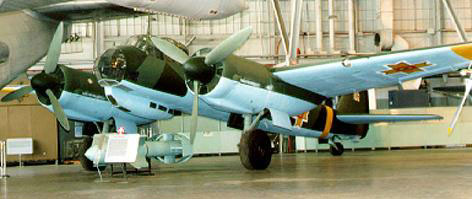Junkers Ju 88

|
This German two/five-seat bomber, close-support aircraft, nightfighter,
torpedo launcher and reconnaissance aircraft was in service from 1939
to 1945. With the British Mosquito the Ju 88 ranks as the most
versatile combat machine of all time. It was originally designed by a
small group led by two Americans experienced in modern all-metal
"stressed skin" construction. The first prototype flew in December
1936. It won speed records but the design had to be greatly altered
before the Ju 88A-1 entered service with the Luftwaffe in late 1939.
It was easily the fastest of the three chief types of German medium
bombers
(Heinkel 111,
Ju 88 and Dornier Do 17), having a speed close to 480km/h when not
loaded. The bomb load was large, 1,800kg being carried in an internal
bay and on four inner-wing racks. The engines were two 1,200hp Jumo
211B's, and the crew of three or four sat close together in the
efficient forward fuselage with perfect all-round view and the usual
armament of three hand-aimed machine guns. The 88, called "the
Three-Fingered 88" because of its long engine cowlings (which looked
like radials because of the circular cooling radiators), was extremely
strong and very maneuverable, but in the Battle of Britain it was shot
down as easily as the other day bombers. Desparate defensive measures
included four separate MG 15 machine guns all aimed by one man. Large numbers of Ju 88A-4 were built with longer wings to carry loads up to 2,500 or 3,000kg. Despite this the 88 continued to operate from rough sod airstrips, especially on the Russian front, its big mainwheels riding over the squashy surface and then turning through 90o to lie flat in the rear of the nacelles. Dive brakes under the wings were seldom used, since most missions were level bombing at high or very low altitudes. Versions were produced for torpedo launching, nightfighting, training and various special duties, while the 88D series were tailored to long-range reconnaissance. The last of the bomber and reconnaissance versions was the slim streamlined Ju 88S, usually with 1,700hp BMW 801G radials, 1,810hp 801TJ or 1,750hp Jumo 213E. Altogether 10,774 of all these versions were built. |





